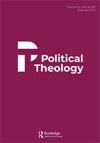Foregrounding the Political in the Thought of Cohen, Buber, and Levinas
IF 0.4
0 RELIGION
引用次数: 0
Abstract
Vincent Lloyd is a visionary in the intersecting areas of philosophy/Theory and religious/ Jewish and political thought. His invitation, which, with characteristic lightning speed, he put to me just after the advance announcement had gone out that my book, Ethics Out of Law: Hermann Cohen and the “Neighbor,” would be published, to contribute to a forum that would put it in conversation with two other titles—Levinas’s Politics. Justice, Mercy, Universality, by Annabel Herzog, and Martin Buber’s Theopolitics, by Samuel Hayim Brody—is perfectly representative of this. Looking at our three publications alongside each other is indeed an excellent occasion for accounting for some key contemporary paths of inquiry in (Euro-)Jewish philosophy and Theory. The obvious tie is that all three of our books inquire into “politics” in and through the thought of the authors we are studying: Hermann Cohen, Martin Buber, and Emmanuel Levinas. (A fourth name to be mentioned is that of Franz Rosenzweig, who, while not a direct focus of our three books, is often essential to refer to when discussing Cohen, Buber, and Levinas within the trajectories of twentieth-century Jewish thought.) Although, as indicated by my book’s title, my project was to discover how “ethics” is thought by Cohen to emerge out of “law,” the mode of inquiry into “law” that Cohen participates in is indeed at the same time a project of social and political thought. For all three of our authors, there has been, historically, limited attention to whether they contributed to questions concerning politics, or to how political concepts figured into their thinking. The names Levinas and Cohen, as well as Rosenzweig, often signified an argument for or about “ethics.” Whenever such claims have been cognizant of Jewish traditions or Jewish existence, they have also been in explicit or implicit continuity with certain modern understandings, dating from the late eighteenth century, of Judaism as an “ethical” religion or tradition, and of an “ethics of Judaism.” In a related constellation, the names Cohen, Buber, Rosenzweig, and sometimes also Levinas, were often arranged around the Buberian notion of “dialogue,” the idea of an elemental relation between an “I” and a “You.” That relation would be understood as a model of ethical comportment toward the other, an authentic experience of, or foundational precondition for sociality. If these thinkers, along with others who have been canonical for modern Jewish thought, were especially embraced for their evocations of ethics, this went along with a historic downplaying of the categories of politics and law in Jewish self-understandings since the beginnings of Emancipation. Famously, the conditions of acceptance of Jews as论科恩、布伯和列维纳斯思想中的政治
文森特·劳埃德是哲学/理论与宗教/犹太和政治思想交叉领域的梦想家。就在我的书《法律之外的道德:赫尔曼·科恩和“邻居”》即将出版的预告发布后,他以闪电般的速度向我发出了邀请,邀请我为一个论坛做出贡献,该论坛将与另外两本书——莱文斯的政治——进行对话。Annabel Herzog的《正义、慈悲、普遍》和Samuel Hayim Brody的Martin Buber的《神学》完美地代表了这一点。把我们的三本出版物放在一起看,确实是一个很好的机会,可以解释(欧洲)犹太哲学和理论中一些关键的当代研究途径。显而易见的是,我们的三本书都是通过我们正在研究的作者赫尔曼·科恩、马丁·布伯和埃马纽埃尔·莱维纳斯的思想来探讨“政治”的。(第四个要提到的名字是Franz Rosenzweig,他虽然不是我们三本书的直接焦点,但在20世纪犹太思想的轨迹中讨论科恩、布伯和莱文时,他经常是必不可少的。)尽管正如我的书名所示,我的项目是发现科恩认为“伦理”是如何从“法律”中产生的,科恩参与的对“法律”的探究模式实际上同时也是一个社会和政治思想的项目。对于我们三位作者来说,从历史上看,他们是否对政治问题做出了贡献,或者政治概念如何融入他们的思维,都受到了有限的关注。Levinas和Cohen以及Rosenzweig这两个名字通常意味着对“伦理”的争论。每当这些主张认识到犹太传统或犹太人的存在时,它们也与某些现代理解保持着明确或隐含的连续性,这些理解可以追溯到18世纪末,即犹太教是一种“伦理”宗教或传统,以及“犹太教伦理”。在一个相关的星座中,科恩、布伯、罗森茨威格,有时还有莱维纳斯,这些名字经常围绕着布贝里的“对话”概念排列,即“我”和“你”之间的基本关系。这种关系可以被理解为对他人的道德行为模式,或社会性的基本前提。如果说这些思想家,以及其他现代犹太思想的典范,因其对伦理的唤起而受到特别欢迎,那么这与自解放之初以来犹太人自我理解中对政治和法律类别的历史性淡化是一致的。众所周知,接受犹太人作为
本文章由计算机程序翻译,如有差异,请以英文原文为准。
求助全文
约1分钟内获得全文
求助全文

 求助内容:
求助内容: 应助结果提醒方式:
应助结果提醒方式:


